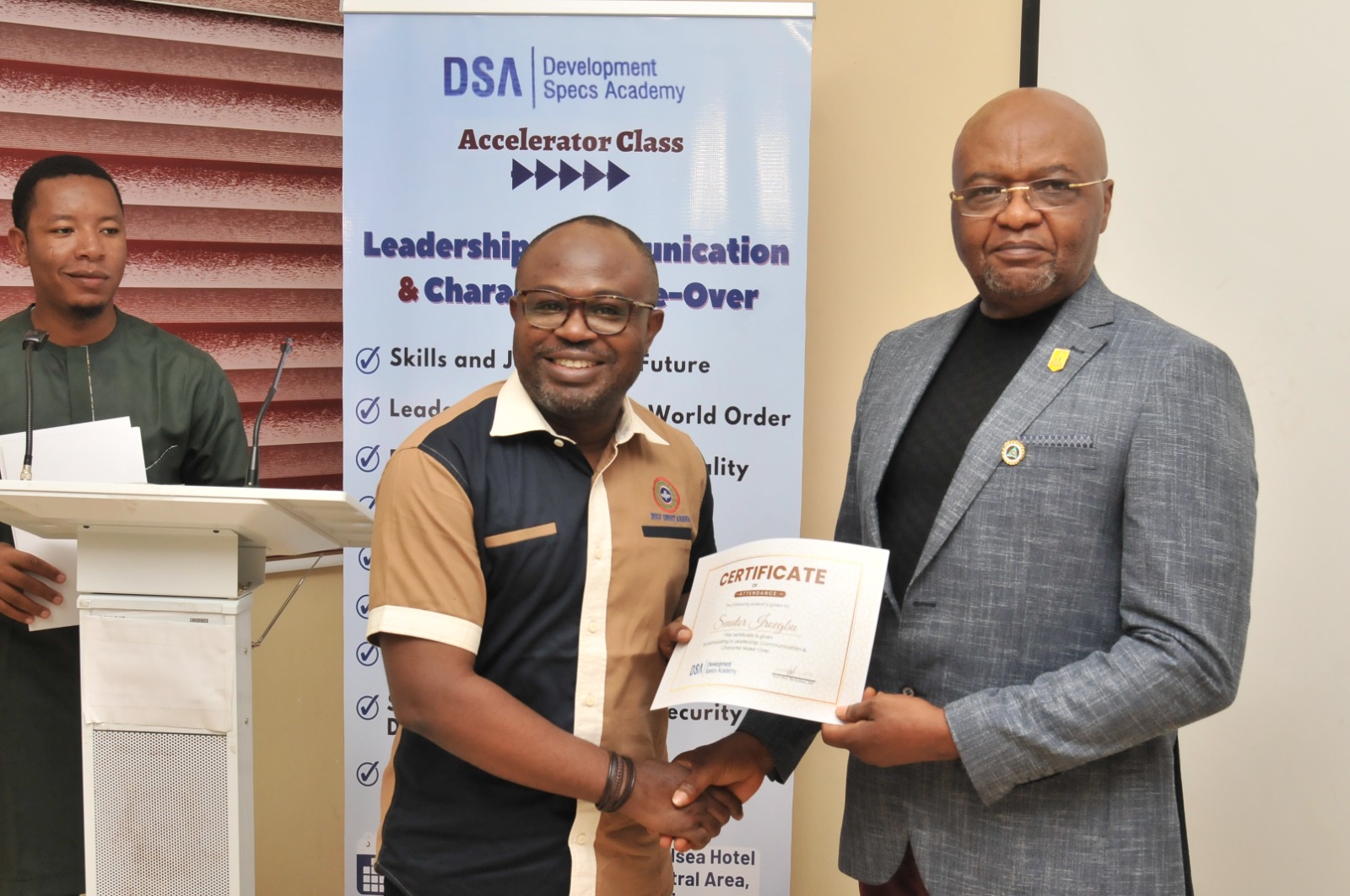In the world today the issues of leadership, communication, critical thinking, and emotional intelligence, are critical to development. This was the focal point of an intensive two-day leadership programme by the Development Specs Academy (DSA) for participants from the private and public sector, offering profound insights into contemporary leadership challenges and solutions. Key themes included the importance of process in leadership, understanding one’s environment, and the synergy between Emotional Intelligence and Communication. This transformative event underscores the pressing issues at the core of modern leadership, writes Senator Iroegbu
The ‘Accelerator Class’
The Development Specs Academy (DSA) has established itself as a centre of excellence in professional development, dedicated to empowering individuals across diverse sectors to excel in an ever-evolving world. Renowned for its commitment to curating transformative learning experiences, DSA has recognised that the evolving demands of 21st-century leadership extends beyond traditional paradigms. It therefore embarked on a pioneering journey to address these multifaceted challenges faced by professionals from varied backgrounds, each driven to gain a competitive edge in their respective fields.
To this end, “Accelerator Class’ was designed to provide participants with a comprehensive grasp of contemporary leadership imperatives. Guided by Professor Okey Ikechukwu, an authority in leadership and communication, the programme encompassed an array of themes crucial in the modern professional landscape. Drawing attendees from pivotal sectors such as defence and security, banking and finance, justice, and media, the class fostered a vibrant exchange of ideas and experiences. This diversity not only enriched the learning environment but also facilitated cross-industry insights and invaluable networking opportunities.
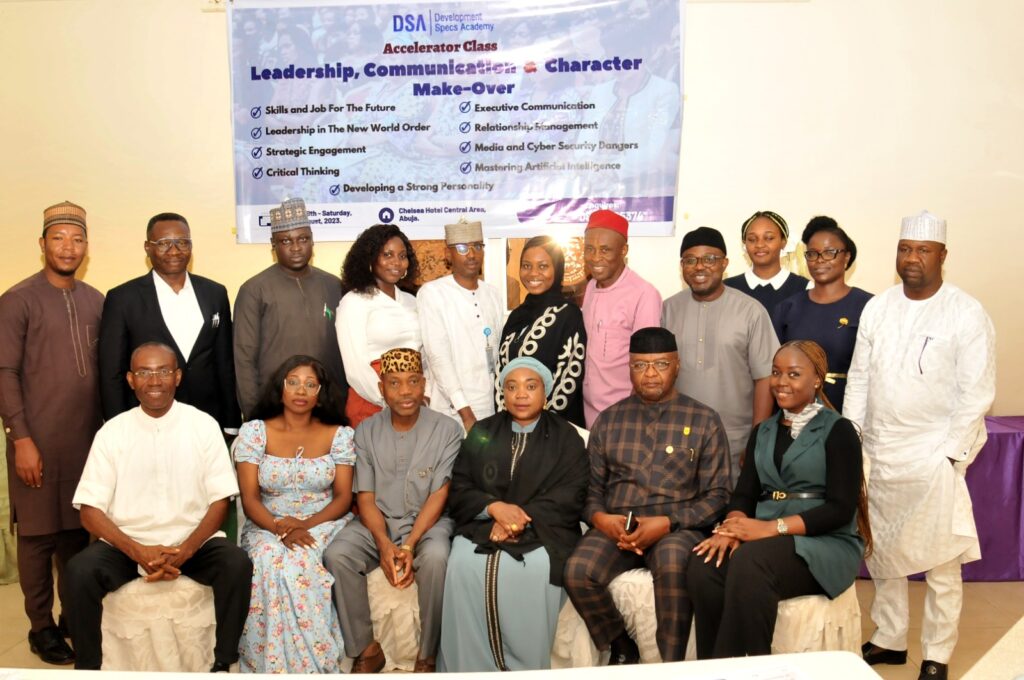
Key themes and insights
Executive communication: Prof. Ikechukwu’s astute observation that leaders often prioritise results over process catalysed in-depth discussions on the significance of comprehending and valuing the journey toward goals. This paradigm shift challenged participants to reassess their leadership approaches, underscoring the vital role of a deliberate and well-considered process.
Leadership in complex environments: The programme emphasised the essentiality for leaders to have a profound grasp of their surroundings. Neglecting this understanding, it was stressed, can lead even well-intentioned leaders astray. The concept of ‘terrain analysis’ emerged as a cornerstone of effective leadership.
Emotional intelligence and communication: The intricate interplay between Emotional Intelligence (EQ) and communication took center stage. Participants delved into the significance of self-awareness, self-management, social awareness, and relationship management in the modern leadership landscape.
Relationship management and public communication: Engaging sessions on relationship management, public speaking, and public communication featured distinguished experts sharing their insights. These sessions underscored trust, respect, and the art of clear and concise messaging, especially when addressing contentious issues.
Critical thinking in leadership and communication: The class illuminated the nuanced art of ensuring that information is not merely heard but comprehended. Critical thinking’s role in conflict resolution, risk mitigation, informed decision-making, and effective communication was fervently emphasised.
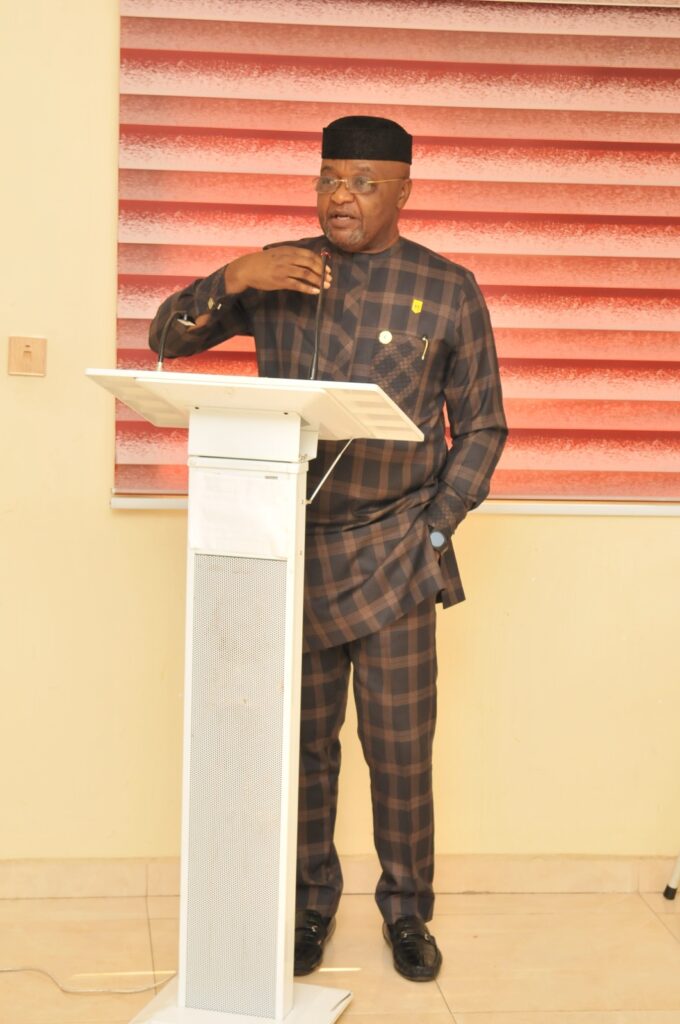
In a nutshell, the Accelerator Class on “Leadership and Personality Make-Over” stands as a testament to DSA’s unwavering commitment to equipping leaders with the multifaceted skills necessary for success in the modern professional landscape. This transformative experience has left participants with profound insights into the evolving demands of leadership, from the significance of process to environmental awareness, emotional intelligence, effective communication, and critical thinking. Armed with these insights, leaders from diverse sectors are poised to navigate the intricate landscape of the 21st century with skill, finesse, and excellence.
“A leader who neglects the importance of process lacks discretion. It is imperative to inquire how you achieved your goals. While both process and results are vital, the process holds paramount importance”
Prof. Okey Ikechukwu
Leadership and personality make-over
The enlightening Accelerator Class, explored deep into the compelling theme of “Leadership and Personality Make-Over.” Led by Prof. Ikechukwu, DSA dissected array of pivotal topics, shedding light on the skills and prospects for the future job landscape, leadership in the context of the New World Order, fostering a resilient personality, strategic engagement, critical thought cultivation, executive communication refinement, adept relationship management, navigating the intricacies of social media, cybersecurity vigilance, and mastering Artificial Intelligence.
However, the focal point of this intensive two-day training course was “Executive Communication.” Ikechukwu, in his introductory remarks, illuminated a significant revelation derived from pre-training assessments – the emphasis on results over the process.
“A leader who neglects the importance of process lacks discretion. It is imperative to inquire how you achieved your goals. While both process and results are vital, the process holds paramount importance,” he noted.
Further exploring the theme of “Leadership in Complex Environments: Values and Challenges of a 21st Century World,” the Executive Director of DSA underscored the pivotal role of leaders in understanding their environment. The dearth of this knowledge, he posited, is a chief reason why even well-intentioned leaders often fall short.
“Employees can sabotage their employers through counterproductive work behaviours and quiet-quitting.”
Dr. Grace Legbeti
He advocated that knowledge, particularly an understanding of the needs of those under one’s care, stands as the most vital resource a leader can possess. As a top priority, he urged leaders to conduct a comprehensive ‘terrain analysis’ to intimately acquaint themselves with their environment.
“How many of our leaders know much about their environment’, he asked, while a leader as a matter of priority must conduct what is known as a ‘terrain analysis’ to fully “know and understand his environment.”
Ikechukwu went on to delve into topics such as ‘The Role of Emotional Intelligence and Communication in Leadership Success,’ ‘Issues in Cybersecurity and AI,’ and ‘You and Your Personality.’ Through these discussions, he elucidated multifaceted issues, highlighting the intersections between Emotional Intelligence (EQ) and Intelligence Quotient (IQ). He also stressed the significance of self-awareness, self-management, social awareness, and relationship management.
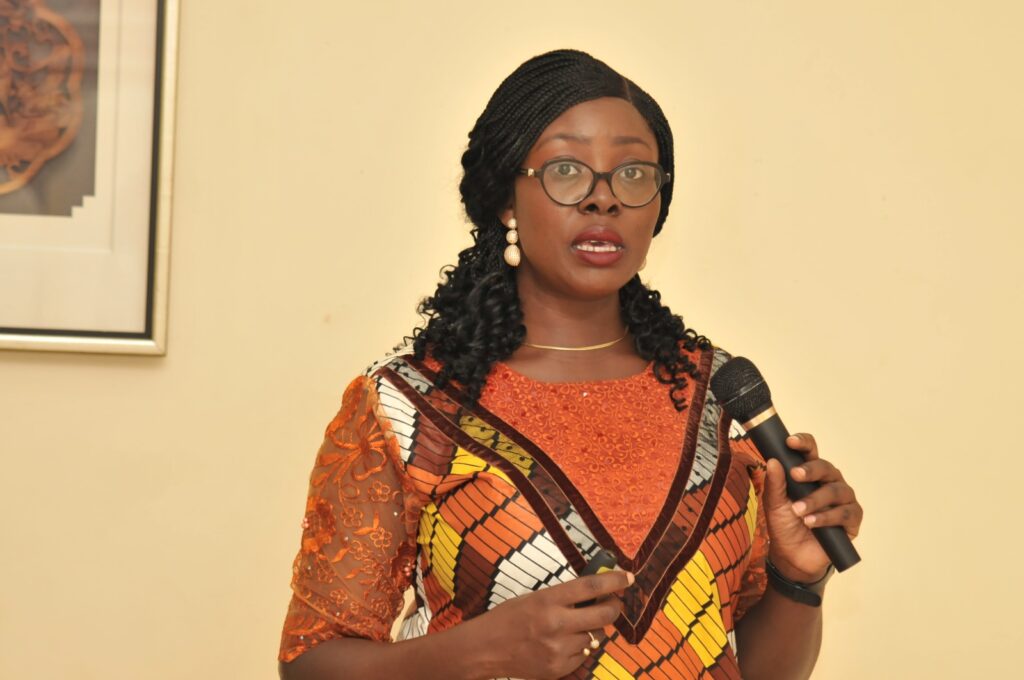
The roster of eminent speakers and facilitators extended to Dr. Grace Legbeti, a lecturer in the Psychology Department of the Nigerian Defence Academy (NDA), who expounded on ‘Relationship Management for Personal and Group Efficiency.’ Dr. Legbeti emphasised that trust and accountability are the cornerstones of workplace relationships. She sternly cautioned that neglecting employee satisfaction can lead to various forms of retaliation, including counterproductive work behaviors and employees quietly disengaging.
“Employees can sabotage their employers through counterproductive work behaviours and quiet-quitting”, she said.
Veteran journalist Mr. Chukwudi Okolie-Ugbaja shared insights on ‘Public Speaking as Executive Communication.’ He underscored the paramount importance of comprehending one’s audience and subject matter while advocating for respect towards the audience. Captivating openings and maintaining eye contact were emphasised, along with the strategic use of a “dramatic pause” to enhance engagement.
“Everything you do in communication matters. Verbal communication needs support from your gestures-honesty in your words, frankness, and authority in your tone,” Okolie-Ugbaja said.
Additionally, Professor Abiodun Adeniyi, the Deputy Dean of the School of Postgraduate Studies at Baze University, Abuja, tackled ‘Public Communication and Institutional Brand Integrity.’ He echoed Ikechukwu’s advocacy for simplicity and conciseness in public communication, asserting that messages should be tailored to the understanding of a six-year-old child. He noted the importance of brevity, especially when responding to contentious situations, suggesting that statements should not exceed one page.
“Always simplify and collapse all your definitions to what you can tell your six-year-old child…say as little as possible while responding to controversial situations”.
“The statement should be concise, crisp, and straight to the point. No matter what the circumstances are, your statement should not be more than one page”, he stated.
The Accelerator Class also incorporated group tasks and practical exercises that delved into “Critical Thinking in Leadership and Communication,” led by Barrister Ch.MC Agbo. Agbo elucidated that critical thinking in communication transcends the mere dissemination of information; it hinges on ensuring comprehension. She outlined the benefits of critical thinking, including conflict resolution, risk mitigation, informed decision-making, and effective communication. To nurture this skill, she advocated for continuous learning, challenging assumptions, fostering self-reflection, and embracing diverse perspectives.
Chukwudi Okolie-Ugbaja
“Everything you do in communication matters. Verbal communication needs support from your gestures-honesty in your words, frankness, and authority in your tone.”
However, Agbo acknowledged that several challenges obstruct critical thinking, including cognitive biases, time constraints, and resistance to change. According to Agbo, critical thinking in communication is not all about putting out information but about being understood. “Communication must be understood, not just heard,” she clarified.
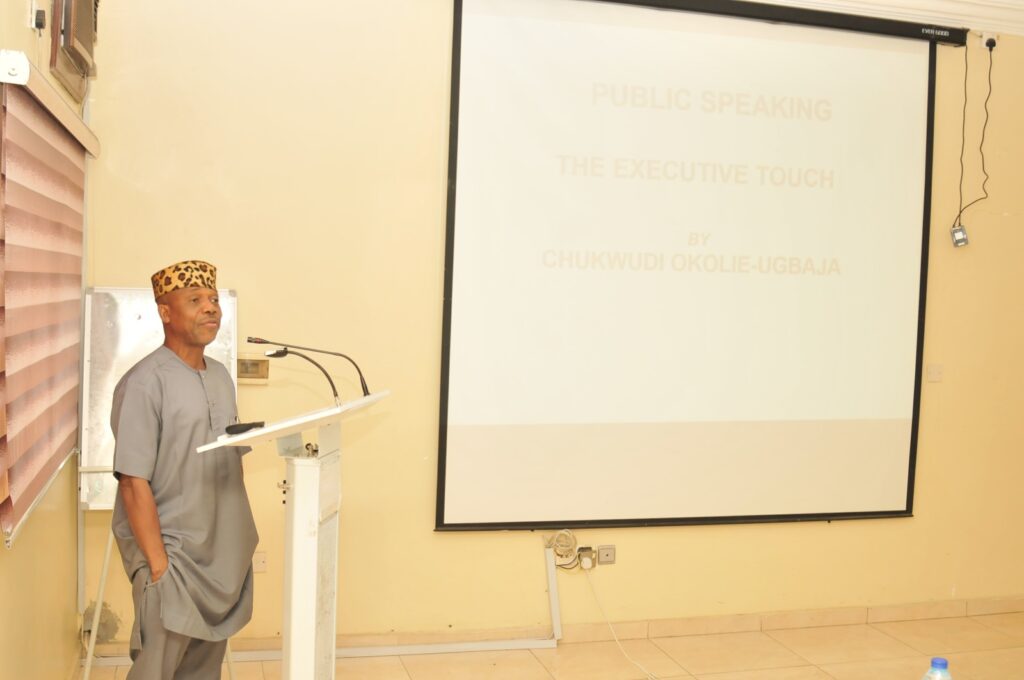
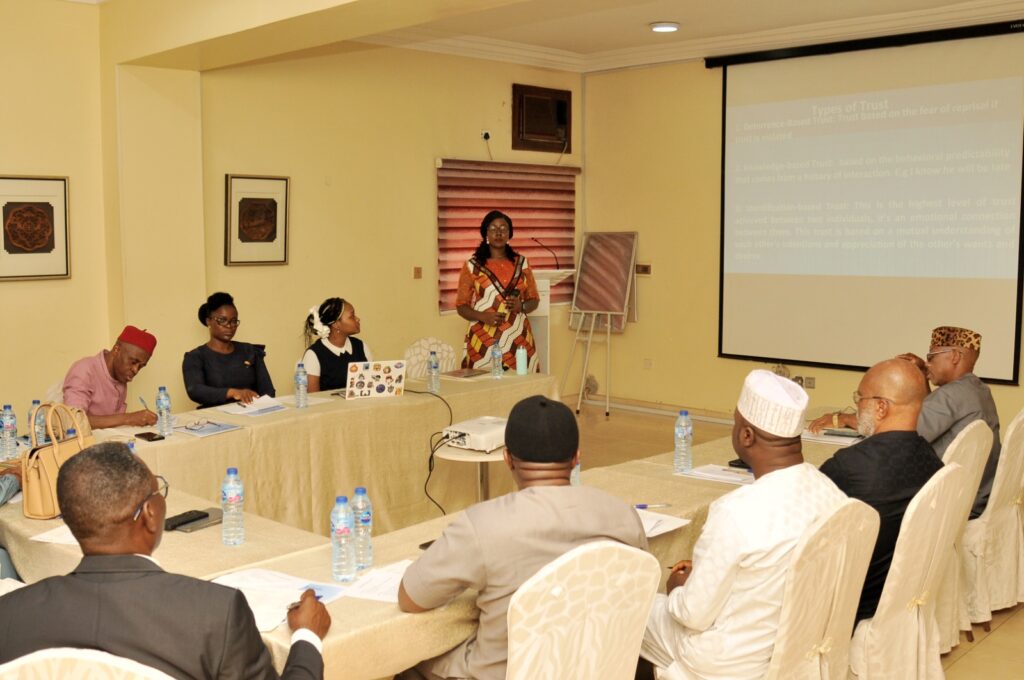
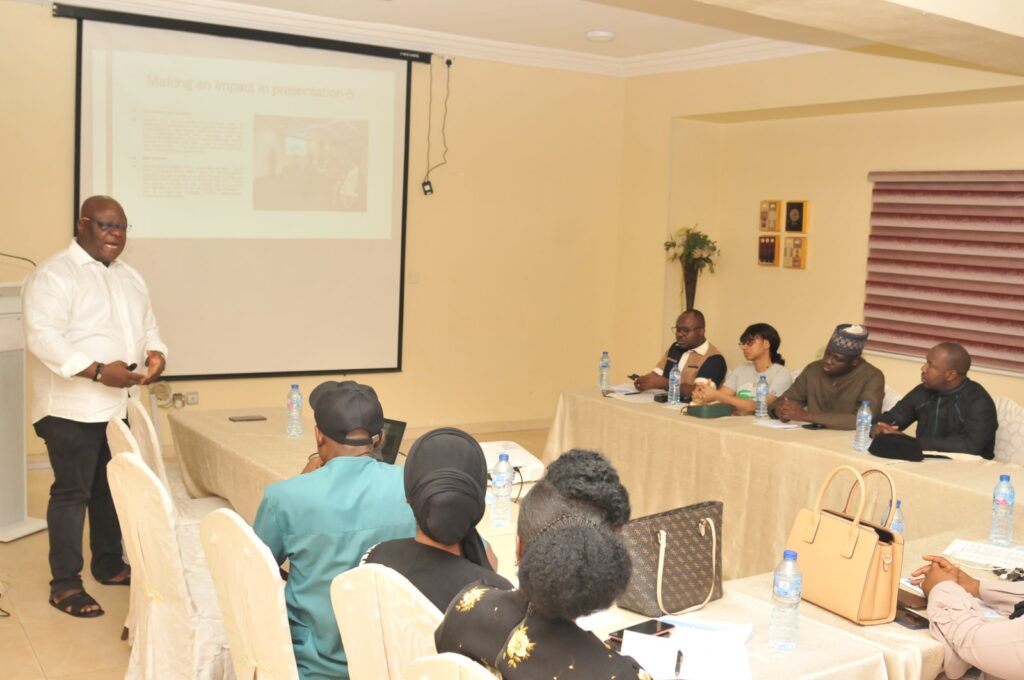
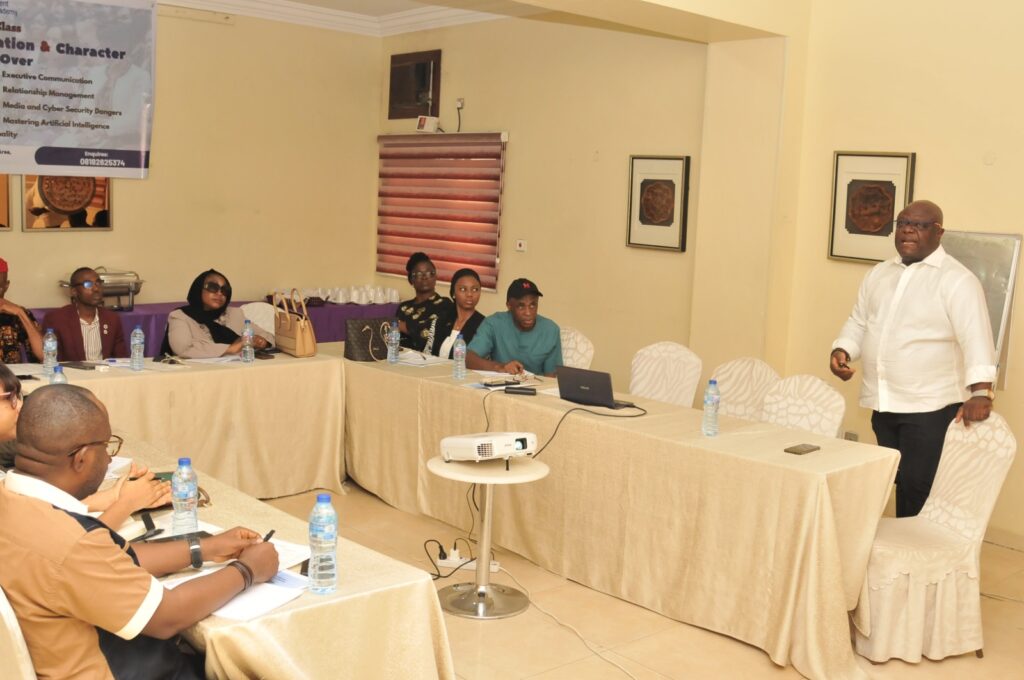
Overall, the two-day accelerator class and executive training distilled a plethora of invaluable lessons. These include the imperative for modern leaders to comprehend their terrain and environment, the significance of embracing KISS (Keep It Simple and Short) and SMART (Specific, Measurable, Achievable, Reliable/Realisable, and Time-bound) principles in communication, and the pivotal role of balancing IQ and EQ for effective leadership, communication, and critical thinking.
Key takeaways
Process matters in leadership: The Accelerator Class underscores the importance of recognising and valuing the process in leadership. While results are crucial, understanding and optimising the journey toward goals is equally vital.
Environmental awareness is essential: Leaders must thoroughly comprehend their surroundings. Neglecting this knowledge can lead to misguided decisions, even for well-intentioned leaders. Conducting a ‘terrain analysis’ is foundational to effective leadership.
Emotional Intelligence drives effective leadership: EQ is inseparable from effective leadership. Leaders should cultivate self-awareness, self-management, social awareness, and relationship management to succeed in today’s complex world.
Effective communication is key: Clear and concise communication, based on trust and respect, is imperative for leaders. Simplicity in messaging, especially during contentious situations, can mitigate misunderstandings and enhance leadership effectiveness.
Critical thinking enhances decision-making: Critical thinking is an essential skill for leaders. It not only aids in conflict resolution and risk mitigation but also leads to informed decision-making and effective communication.
“Always simplify and collapse all your definitions to what you can tell your six-year-old child…”
Prof. Abiodun Adeniyi
Recommendations
Prioritise leadership training: Organisations should prioritise leadership training programmes like the DSA Accelerator Class to equip their leaders with the necessary skills for success in the modern world.
Invest in EQ development: Leaders and aspiring leaders should invest in developing their Emotional Intelligence. This can be achieved through training, coaching, and self-awareness exercises.
Embrace clear communication: Ministeries, Departments and Agencies (MDAs) as well as private organisations should emphasise clear and concise communication in all aspects of their operations. Leaders should be encouraged to simplify messaging, especially in sensitive situations.
Encourage critical thinking: Foster a culture of critical thinking within organisations and MDAs. Encourage employees to question assumptions, practice reflection, and consider diverse perspectives to enhance problem-solving.
Continual learning: Leadership development is an ongoing process. Leaders should commit to continual learning, staying updated on emerging trends, and attending programmes like the DSA Accelerator Class to refine their skills and adapt to changing environments.
Conclusion
The DSA Accelerator Class on Leadership, Communication, Eemotional Intelligence, and Critical Thinking has undoubtedly equipped its participants with a profound understanding of the multifaceted challenges and opportunities in leadership. In a world of evolving complexities, the knowledge and insights garnered from this programme are poised to empower leaders across industries to navigate the ever-changing landscape with finesse and excellence.
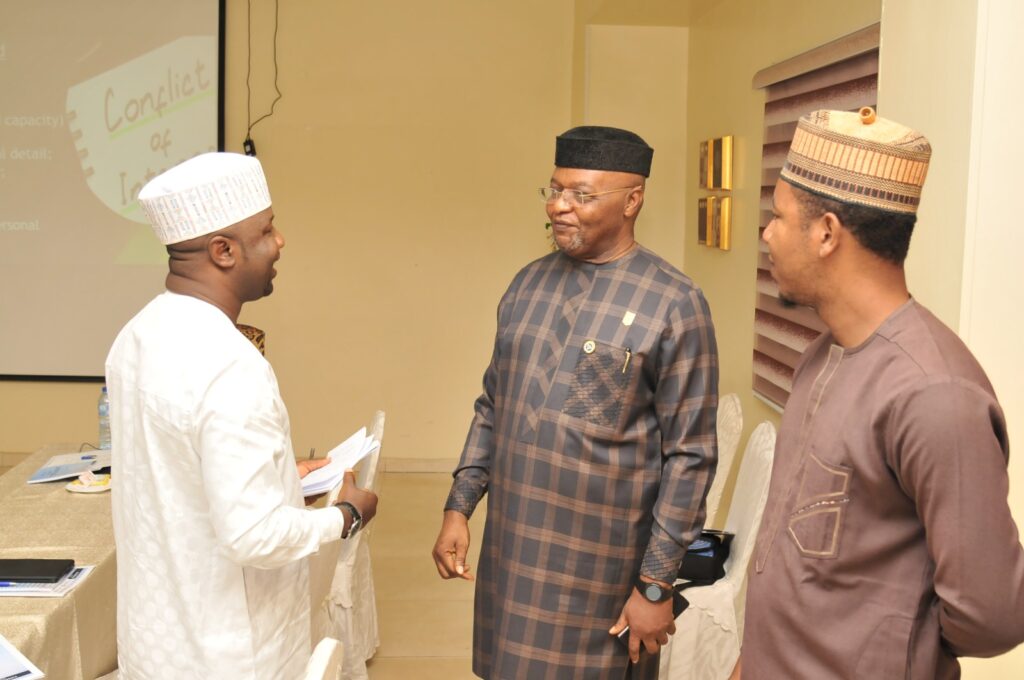
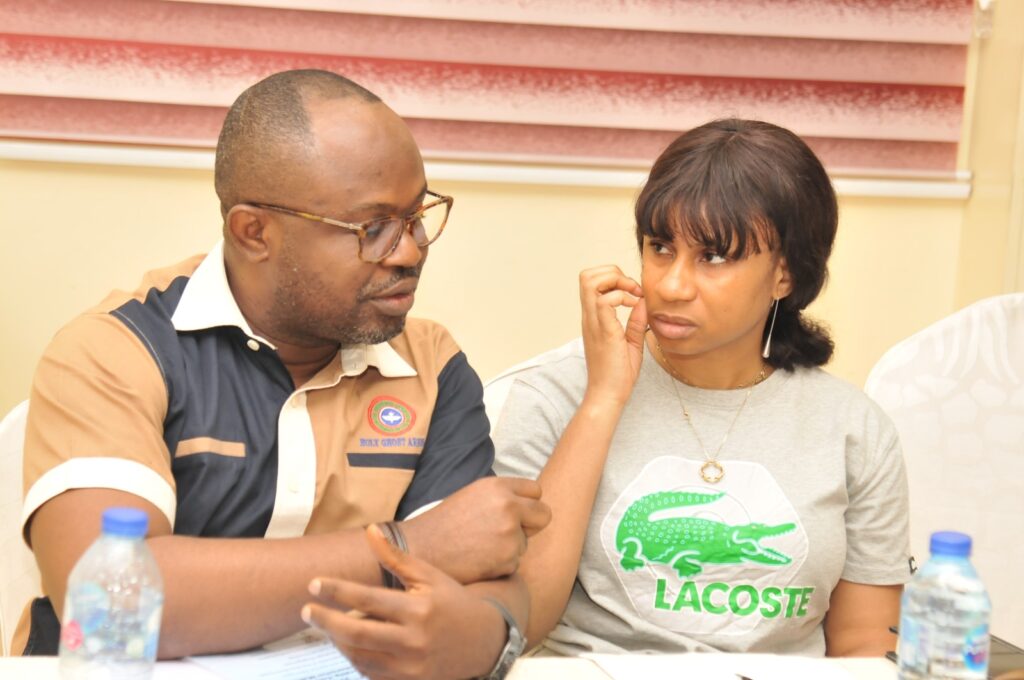
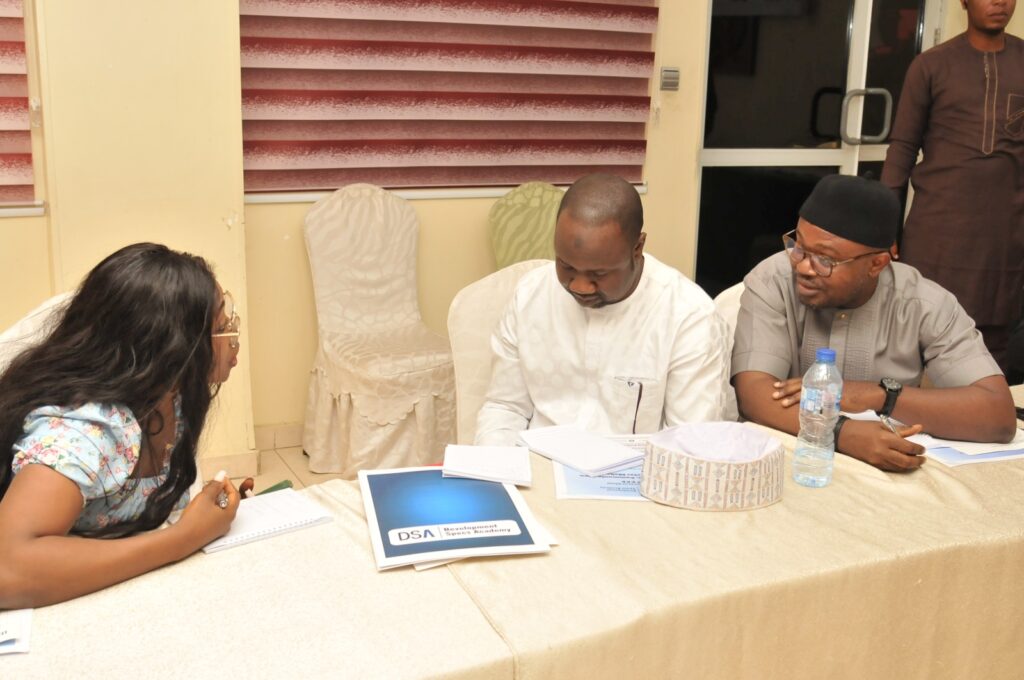
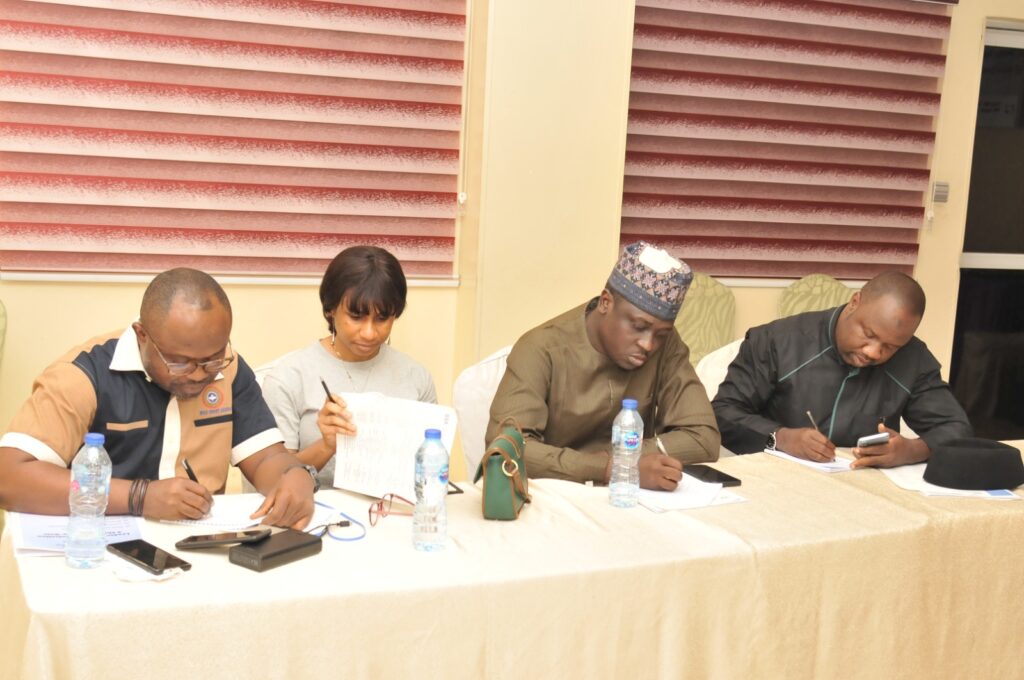
“Communication must be understood, not just heard.”
Barrister Agbo
There is no doubt that in the dynamic landscape of modern leadership, the DSA Accelerator Class on “Leadership and Personality Make-Over” has illuminated a path forward. It has ignited the beacon of awareness, reminding us that leadership is not solely about reaching the destination but understanding and valuing the journey. The imperative of environmental awareness, emotional intelligence, clear communication, and critical thinking has been etched into our leadership psyche. As we move forward, it reminds us not merely to acknowledge these lessons but internalise and apply them. It urges leaders to foster a culture of continuous learning, embrace the complexities of our environments, and nurture our emotional intelligence. The training was also a clarion call to communicate with clarity and simplicity, respecting our audience and recognising that process and results are intertwined. More importantly, it urged modern leaders to always employ critical thinking as a guiding compass that will lead to informed decisions, effective communication, and resolutions that serve the greater good. In doing so, we shall not only navigate the challenges of the 21st century but thrive within them, forging a new era of impactful leadership and personal growth.

